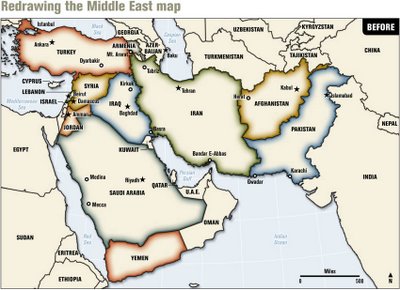

Blood borders
How a better Middle East would look
By Ralph Peters
Maj. Peters, formerly assigned to the Office of the Deputy Chief of Staff for Intelligence where he was responsible for future warfare, candidly outlines how the map of the Middle East should be fundamentally re-drawn, in a new imperial endeavour designed to correct past errors. “Without such major boundary revisions, we shall never see a more peaceful Middle East,” he observes, but then adds wryly: “Oh, and one other dirty little secret from 5,000 years of history: Ethnic cleansing works.”
“A Free Kurdistan, stretching from Diyarbakir through Tabriz, would be the most pro-Western state between Bulgaria and Japan.”
“Iraq’s three Sunni-majority provinces as a truncated state that might eventually choose to unify with a Syria that loses its littoral to a Mediterranean-oriented Greater Lebanon:
the Shia south of old Iraq “would form the basis of an Arab Shia State rimming much of the Persian Gulf.”
Jordan, a US-Israeli friend in the region, would “retain its current territory, with some southward expansion at Saudi expense.
the unnatural state of Saudi Arabia would suffer as great a dismantling as Pakistan.”
Iran too would “lose a great deal of territory to Unified Azerbaijan, Free Kurdistan, the Arab Shia State and Free Baluchistan, but would gain the provinces around Herat in today’s Afghanistan.”
As for the goals of this plan, Maj. Peters is equally candid...-- “and for access to oil supplies in a region that is destined to fight itself”.
“Those of us who can sort, digest, synthesize, and apply relevant knowledge soar--professionally, financially, politically, militarily, and socially. We, the winners, are a minority.”
The coming clash, then, is not really about blood, faith, ethnicity, at all. It is about the gap between the haves and the have-nots.
“we will become still wealthier, culturally more lethal, and increasingly powerful. We will excite hatreds without precedent.”
No comments:
Post a Comment